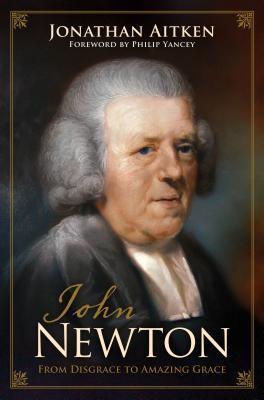What do you think?
Rate this book


Most Christians know John Newton as a man who once captained a slave ship, was dramatically converted to Christ on the high seas, and later penned one of the greatest hymns of the faith, “Amazing Grace.” But he also had a huge impact on his times as an icon of the evangelical movement, as a great preacher and theologian, and as a seminal influence on abolitionist William Wilberforce. Newton’s friendship with Wilberforce is portrayed in the major motion picture Amazing Grace.
Jonathan Aitken’s new biography John Newton explores all these facets of Newton’s life and character. It is the first biography to draw on Newton’s unpublished diaries and correspondence, providing fresh insight into the life of this complex and memorable Christian. The result is a fascinating, colorful, and historically significant portrait of John Newton, a self-described “great sinner” redeemed by a great Savior through amazing grace.
“A new life of John Newton is a fitting celebration of the bicentennial both of Newton’s death and of the abolition of the slave trade, Wilberforce’s triumph in which Newton played a key role. Master biographer Jonathan Aitken is in fine form, sympathetic, insightful, scholarly, and vivid, and his book, like its subject, must be rated spectacular.”
J. I. Packer, Board of Governors’ Professor of Theology, Regent College
“A riveting historical account of the life of this notorious eighteenth-century sinner who was dramatically saved by God’s grace. This book should be required reading for any person who loves history, loves the song, and is serious about following Christ.”
The Honorable Jack Kemp, former Secretary of Housing and Urban Development; former U.S. Congressman
“A rip-roaring adventure, a passionate romance, and an astonishing journey of faith all in one. I knew the story well, but this telling made a deep impression on me.”
Os Guinness, author of The Call
“Jonathan Aitken has written such an intimate account of one of the great saints of God that I can now say I have been mentored by John Newton!”
Joel Hunter, Senior Pastor, Northland, A Church Distributed, Longwood, Florida
“Jonathan Aitken’s fast-paced, well-researched, and detailed book shows why Newton was such an important figure. This is a book to read, ponder, and read again.”
Mark Noll, Francis A. McAnaney Professor of History, University of Notre Dame
“A fresh, insightful, and inspiring account of this great figure. With that rare skill of a superb biographer, Aitken brings Newton to life for a new generation of admirers.”
Alister McGrath, Professor of Historical Theology, Oxford University
“In careful and colorful detail, Aitken resurrects this nearly forgotten giant of the faith and establishes Newton in his rightful place as one who has altered the course of western history.”
Robert Lupton, President, FCS Urban Ministries, Atlanta
“Skilled biographer that he is, my friend Jonathan Aitken has brought to life one of eighteenth-century England’s most influential Christians. The story of amazing grace both in the life of Newton and in the song that has become the Christian national anthem.”
Chuck Colson, founder, Prison Fellowship
“Only God could take a vile slave trader and turn him into a useful instrument in abolishing the slave trade and igniting a gospel revival, the flames of which are burning still. The story of Newton’s life inspires all who seek to follow the path of Jesus today.”
Timothy George, Dean of Beeson Divinity School of Samford University; Executive Editor, Christianity Today
“John Newton not only wrote one of the greatest hymns of all time—he lived one of the greatest stories of salvation.”
Rodney Stark, Author of The Rise of Christianity
“Even more amazing than Newton’s life with all its drama and color is the reminder of how completely revolutionary is God’s agenda to change the world his own way and through imperfect, broken people. Newton is just another entry to God’s long resumé of his amazing grace in changed lives.”
James MacDonald, Senior Pastor, Harvest Bible Chapel, Rolling Meadows, Illinois
“An informed, authoritative biography of the man who played a critical role in helping William Wilberforce abolish the slave trade. His life story is absolutely spell-binding. I could not put the book down.”
Armand M. Nicholi Jr., M.D., Professor of Psychiatry, Harvard Medical School; author of The Question of God
“Jonathan Aitken has written a book that, enriched by fresh research into unpublished papers, will enhance his reputation as one of today’s foremost biographers.”
Rev. Dr. Michael Green
400 pages, Hardcover
First published January 1, 2007